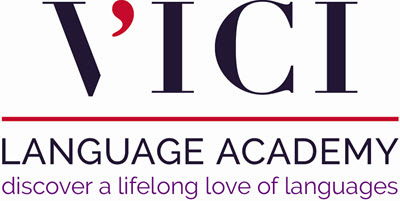Nathalie, our founder and director was interviewed by Claire Burdett from Kennet Radio on her Friday Social Show, so Newburians could find out a little more about Vici and all things foreign languages!
How long have you lived in Newbury?
I moved to the UK in September 2000 so 18 years ago and I’ve lived in Hampshire, Buckinghamshire and Berkshire but moved to Newbury three years ago.
Where were from originally?
I am originally from the Jura, in the east of France.
Where are you at the moment?
That’s where I am currently! We have an office in France (a subsidiary to the academy in Newbury) and I’m spending a few weeks there, also catching up with my family!
How many people do you teach languages to a year at the moment?
On average, we welcome between 180 to 220 regular students at the academy. These are local to Newbury and the surrounding villages.
We also work with larger corporate companies and most of them choose to train their staff via our language learning platform, i.vici (live lessons with a language coach), and this represents an additional 80 to 100 students currently. These students tend to be located anywhere in the UK, but also in France and Spain at the moment.
We have partnerships with French secondary schools so we welcome larger groups of children several times a year for short periods of time.
So we are never bored at Arcade house!
How many languages do you teach at the Vici?
11! French, Spanish, Portuguese, Italian, German, Polish, Russian, Arabic, Japanese, Mandarin and of course English as a foreign language.
Children and adults – what is the main focus for people learning languages here in Newbury?
It very much depends. I’d say that the key to success is to have a compelling reason as to why you want to learn a foreign language, so the main focus tends to range from looking to invest in your personal development (a vast majority of our long-standing customers), to wanting a career change and seeking to add a very tangible asset to your CV.
We help many people with properties abroad or who are looking to move/retire to another European country.
In the last few years, we’ve also welcomed many senior citizens as it’s now proven by science that learning a foreign language will delay the signs of dementia and keep your brain very fit!
Parents want their children to be immersed in a foreign language at a young age or help their teenagers or young adults excel in language exams at school.
So there are countless reasons as to why people will decide to invest in learning a foreign language.
Do you have summer school or similar?
Yes we do. As a matter of fact, the academy only closes for a week at Christmas – we remain open throughout the year as learning a language is all about consistency and continuity so we want to ensure that our students receive an excellent service all year long.
During the summer, we welcome quite a few overseas students who are looking to come and immerse themselves in the British culture and enhance their language skills; they generally stay with us between 1 and 4 weeks. We work with quite a large number of host families who look after them and they come to the academy every day for English coaching.
Do you see a rise in the spring ie is it to do with people preparing to go on holiday?
There is always a rise in the spring and the autumn because that tends to be when people think about their various projects and are keen to start new things, or tick that particular item off their bucket list!
Interestingly enough, It’s when people come back from their holiday that they realise they want to do something about their language skills, and not before. That’s better! They have a whole year to learn before they go back!
How long does it normally take for someone to learn a new language?
That’s the $1 million question!!
It of course depends on how committed the student is, how much time can be invested in learning this new language and how often the student will find himself or herself immersed in that language.
Things also don’t quite work the same between children and adults as while children are able to adapt to a foreign language much quicker and for example very often pick up a better accent, their brain isn’t mature enough yet to progress as at a fast pace. (That’s if they come to the academy and join a leisurely bilingual programme, not move permanently to a foreign country)
Practically, I would say that for our students who attend group sessions twice a week or have an hour or two of private 1:1 coaching and if, in addition, they can try and supplement their learning at home with a 10 minute read a week or going through their notes, they can cover good basics in 6 to 8 months, learn to get by within 12 to 18 months, and are able to have a full conversation between 36 to 48 months.
It’s also very important to understand that there are various degrees of fluency, and that we all have different communication strengths so while some students may be comfortable with the language quite early on and hold a very decent conversation after a few months, they may find that understanding others is a challenge and vice versa.
It’s vital to keep in mind that learning a foreign language is a journey… I’ve lived in the UK for 18 years and I still come across words or colloquialism I had never heard before – but then, this happens with my native tongue too! That’s why learning and progressing in a foreign language is such an amazing adventure!
Just remember that a fluent speaker is a beginner… who never gave up!
What’s the most popular language for us Newburians to learn?
It’s French! 10 years on and it continues to be, closely tackled by English as a foreign language as Newbury is quite a cosmopolitan little town!
Any advice for people wanting to learn a new language before their holidays?
Sure. I think it’s important to do something very condensed and structured. Picking up bits and pieces from books or apps is really not going to achieve much without any clear structure around it (although they can be great add-on resources); structure does not mean boring, you can still have lots of fun with very lively lessons.
Waiting to learn a language to just get by on holiday is wonderful as it really does transform your holidays abroad. It’s all about learning ready-made sentences, a few common verbs and a maximum of vocabulary.
I would advise to do a 6 hour 1:1 (or 1:2, as learning with your spouse or a friend is very motivating) condensed programme where you can choose up to 6 topics to cover: restaurant, directions, doctors emergencies…
Your lessons will then be planned as follows: spend 20 minutes to play with the language with short role-plays, cards, videos so you can start building good oral communication skills and allow 30 to 40 minutes for the rest of the session where you will focus on each topic with set learning objectives. We regularly do this at the academy with a programme called the Vici Express and it works very well.
I saw you had a Vici summer party, is this a regular thing? Tell me more.
It was our 10th anniversary celebration! And it was a huge success with lots of our current and past students coming along, suppliers, friends, other local businesses… There was just a very friendly and warm atmosphere, with some wonderful people congratulating us on getting to the 10 year mark. Very humbling and rewarding.
Any events coming up?
Yes we do!
There is a French holiday workshop planned on August 28 between 4 and 6 PM for children between the age of 3 and 13, with a theme ‘Colour in French’ (creation of displays so a mix between language and art & craft).
We have a 12 week Spanish Foundation Programme starting on the 10th of September and a few spaces are still available.
My next bilingual book ‘Max & Sacha 2’ will be launched very shortly and should be of interest to all our local little linguists!
And finally, we will be present at the London Language Show on the weekend of 9th to 11th of November and I will be on stage on Saturday at 1:35 PM to talk about “how to run a sustainable business teaching modern foreign languages.”

